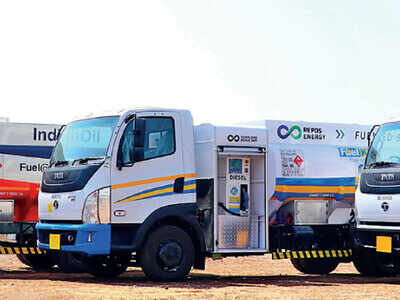Meet the Pune couple who is transforming the delivery of diesel across India

Repos Energy has manufactured about 60 bowsers in two months
When cyclone Fani struck Odisha in the first week of May, bowsers were sent immediately to rural areas of the state, to rescue villagers on speedboats and to enable mobile phone towers to resume functioning. “Later, government officials appreciated us for sending the bowsers there quickly. More people could be rescued, because the National Disaster Response Force (NDRF) had not thought of providing refuelling access to their motorboats,” says Chetan Walunj, the 30-year-old CEO of Repos Energy, which is a citybased start-up backed by Ratan Tata.
Repos, which stands for “relentlessly positive”, offers a technology-enabled system for diesel to reach the doorstep of end-users. Combining technology with logistics through a mobile app, the company also provides mobile refuelling stations.
The venture began as a dream in 2015, when Chetan and his wife Aditi, who were then in their late 20s, started thinking about a seamless fuel-delivery model. “Suppose a bridge is being built on a river in a remote location, from where the nearest filling station is 50 km — how much extra cost will the project manager incur to procure diesel for gensets and machinery? The overhead costs due to only the fuel would raise the overall project expenditure,” explains Chetan. A mobile tanker delivering fuel at the site would cut down costs, he adds. Similarly, in rural areas, where farmers need diesel for tractors and deep borewells, supplying diesel through mobile tankers would benefit them by saving time and cost of sourcing the fuel from towns, says Chetan.
Chetan’s entrepreneurial pursuit found a new vista when he met Aditi, a student of chemistry and forensic sciences who wanted to do something meaningful for society. “We started researching together on a fuel delivery model — something not thought of then even in developed countries like the USA or in Europe. While studying the market and making a business plan, we came across several roadblocks: know-how, infrastructure, and most importantly, government approvals around fuel distribution,” recalls Aditi, Repos’s chief strategy officer.

The idea of a self-sustainable model based on Internet of Things (IoT) also germinated at that time. A start-up of its scale could only be successful if it grew with its own hardware and software. “We decided it was necessary to build the whole ecosystem to successfully manage the logistics. To do this, we created a three-step delivery model — we combined the technology with logistics by developing a mobile app, and replicated a stationary petrol pump on a vehicle chassis, making it a certified smart mobile fuel station (bowser),” explains Chetan.
Since the concept of a mobile fuel station did not exist in the Government of India’s scheme of things, the couple faced serious problems in terms of policy. After months of talks with the Union government, the ministry ofpetroleum and natural gas finally asked Repos to join a pilot project early this year, with three other such start-ups. While the others had only developed apps to procure fuel by tying up with oil marketing companies (OMCs), Repos’s plan included the hardware too — manufacturing fuel tankers with diesel dispensing unit, which was integrated into its in-house app. Besides closely working with the union petroleum minister, Dharmendra Pradhan , the Walunjs’ Make in India initiative drew the interest of the Prime Minister’s Office (PMO) too.
The ministry finally amended the Petroleum Rules, 2002, through a gazette notification on May 29 this year, bringing such mobile refill vehicles under the purview of the new Petroleum (Amendment) Rules, 2019. While working out the business modalities, apart from government regulations, the couple from Walunj stumbled upon another major issue — investment. Repos was completely self-funded in the beginning. “My father, Rajendra Walunj, was the first one to believe in our idea. He joined our company as a director and pumped in Rs 3 crore by selling our lands in Pune,” says Chetan with a smile, as not many fathers would join their child’s start-up at the director level. Aditi adds, “Initially, my father-inlaw was quite apprehensive about our idea of door-to-door fuel distribution, but his strong belief in his son’s ability convinced him. That was our first major breakthrough.”
However, when Chetan and Aditi needed to take the next big step, it came in the form of encouragement, mentoring, and eventually investment, from none other than Ratan Tata. Aditi, who was completely enamoured with the 82-year-old doyen of India Inc when she first met him in October last year, recalls, “We waited outside his house for a whole day, but could not get an appointment to meet him. But Tata called me up personally to meet him the next day. After some three hours of conversation, he seemed impressed and interested in our plan to change the dynamics of fuel management for industries. Then he let us have an opportunity to bask in his knowledge and experience by providing vital inputs.” Their pilot project was to build a bowser forTata Motors in 10 days. “It seemed impossible, but we believe when you set out for the right cause, with the right intention, everything is possible,” adds Chetan. Their venture is now officially backed by Tata.
Repos’s business model offers a petrol pump owner three key mechanisms — a bowser, official licences to operate the bowser, and the app. “We have tied up with all three public sector OMCs —Indian Oil , Bharat Petroleum and Hindustan Petroleum — and some private players too. The owners can use the bowsers, which are of 2,000 litres to 10,000 litres capacity, wherever required,” says Chetan, who now leads a workforce of 175 from a mere two-member team a couple of years ago.
End users being the target group of Repos, the company’s focus revolves around offering convenience to customers without billing them for the benefit (“unless the order quantity is low”). “We meet our costs through gross margins, which we share with the petrol pumps we partner with. As of today, the gross margin on diesel stands at Rs 2.20 per litre; it is shared between petrol pump owners and us in a pre-determined ratio,” explains Chetan, who also gives a glimpse of his company’s monthly turnover — Rs 2 crore now from Rs 70,000 just a few months ago. Repos’s success is evident at the sprawling 1.5 lakh square feet facility in Chakan, which can assemble 1,000 bowsers a year. About 60 have been rolled out so far, since Repos started commercially manufacturing them in April. “We have about 65,000 petrol pumps for 1.3 billion people in India, and we have tied up with only around a 100 in 32 cities, in 64 days. We have just started,” says Aditi, in a voice reflecting the determination of a resolute entrepreneur.

Repos, which stands for “relentlessly positive”, offers a technology-enabled system for diesel to reach the doorstep of end-users. Combining technology with logistics through a mobile app, the company also provides mobile refuelling stations.
The venture began as a dream in 2015, when Chetan and his wife Aditi, who were then in their late 20s, started thinking about a seamless fuel-delivery model. “Suppose a bridge is being built on a river in a remote location, from where the nearest filling station is 50 km — how much extra cost will the project manager incur to procure diesel for gensets and machinery? The overhead costs due to only the fuel would raise the overall project expenditure,” explains Chetan. A mobile tanker delivering fuel at the site would cut down costs, he adds. Similarly, in rural areas, where farmers need diesel for tractors and deep borewells, supplying diesel through mobile tankers would benefit them by saving time and cost of sourcing the fuel from towns, says Chetan.
The entrepreneur was 21 and pursuing mechanical engineering when he became involved in his family’s petrol pump business in Chakan. As early as then, he recognised the importance for even fuel dealers to cater to the needs of consumers. He also realised that the gap in demand and supply of the fossil fuel was widening because of pilferage and spillage, especially in heavy industries, agriculture and infrastructure sectors.
Chetan’s entrepreneurial pursuit found a new vista when he met Aditi, a student of chemistry and forensic sciences who wanted to do something meaningful for society. “We started researching together on a fuel delivery model — something not thought of then even in developed countries like the USA or in Europe. While studying the market and making a business plan, we came across several roadblocks: know-how, infrastructure, and most importantly, government approvals around fuel distribution,” recalls Aditi, Repos’s chief strategy officer.

Aditi and Chetan Walunj flank Ratan Tata, whose encouragement and mentoring helped them get started.
The idea of a self-sustainable model based on Internet of Things (IoT) also germinated at that time. A start-up of its scale could only be successful if it grew with its own hardware and software. “We decided it was necessary to build the whole ecosystem to successfully manage the logistics. To do this, we created a three-step delivery model — we combined the technology with logistics by developing a mobile app, and replicated a stationary petrol pump on a vehicle chassis, making it a certified smart mobile fuel station (bowser),” explains Chetan.
Since the concept of a mobile fuel station did not exist in the Government of India’s scheme of things, the couple faced serious problems in terms of policy. After months of talks with the Union government, the ministry of
The ministry finally amended the Petroleum Rules, 2002, through a gazette notification on May 29 this year, bringing such mobile refill vehicles under the purview of the new Petroleum (Amendment) Rules, 2019. While working out the business modalities, apart from government regulations, the couple from Walunj stumbled upon another major issue — investment. Repos was completely self-funded in the beginning. “My father, Rajendra Walunj, was the first one to believe in our idea. He joined our company as a director and pumped in Rs 3 crore by selling our lands in Pune,” says Chetan with a smile, as not many fathers would join their child’s start-up at the director level. Aditi adds, “Initially, my father-inlaw was quite apprehensive about our idea of door-to-door fuel distribution, but his strong belief in his son’s ability convinced him. That was our first major breakthrough.”
However, when Chetan and Aditi needed to take the next big step, it came in the form of encouragement, mentoring, and eventually investment, from none other than Ratan Tata. Aditi, who was completely enamoured with the 82-year-old doyen of India Inc when she first met him in October last year, recalls, “We waited outside his house for a whole day, but could not get an appointment to meet him. But Tata called me up personally to meet him the next day. After some three hours of conversation, he seemed impressed and interested in our plan to change the dynamics of fuel management for industries. Then he let us have an opportunity to bask in his knowledge and experience by providing vital inputs.” Their pilot project was to build a bowser for
Repos’s business model offers a petrol pump owner three key mechanisms — a bowser, official licences to operate the bowser, and the app. “We have tied up with all three public sector OMCs —
End users being the target group of Repos, the company’s focus revolves around offering convenience to customers without billing them for the benefit (“unless the order quantity is low”). “We meet our costs through gross margins, which we share with the petrol pumps we partner with. As of today, the gross margin on diesel stands at Rs 2.20 per litre; it is shared between petrol pump owners and us in a pre-determined ratio,” explains Chetan, who also gives a glimpse of his company’s monthly turnover — Rs 2 crore now from Rs 70,000 just a few months ago. Repos’s success is evident at the sprawling 1.5 lakh square feet facility in Chakan, which can assemble 1,000 bowsers a year. About 60 have been rolled out so far, since Repos started commercially manufacturing them in April. “We have about 65,000 petrol pumps for 1.3 billion people in India, and we have tied up with only around a 100 in 32 cities, in 64 days. We have just started,” says Aditi, in a voice reflecting the determination of a resolute entrepreneur.

Repos Energy has manufactured about 60 bowsers in two months
GALLERIES View more photos








































Recent Messages ()
Please rate before posting your Review
SIGN IN WITH
Refrain from posting comments that are obscene, defamatory or inflammatory, and do not indulge in personal attacks, name calling or inciting hatred against any community. Help us delete comments that do not follow these guidelines by marking them offensive. Let's work together to keep the conversation civil.